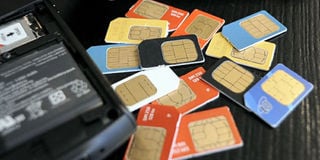Eight arrested, 1,600 SIM cards recovered in phone call scam

Network devices. A display of telecommunication SIM cards
The Uganda Communications Commission (UCC), in a joint operation with police and telecom operators, have arrested eight people engaged in “SIM card boxing”.
Addressing journalists in Kampala yesterday, Mr Ibrahim Bbossa, the UCC spokesperson, said the eight suspects were apprehended from various city suburbs of Masanafu in Rubaga, Kasubi, Clement Hill Road and Nakawa Market at the weekend.
At Masanafu, one sim box was recovered with 545 Sim cards and three suspects were arrested. At Clement Hill Road, one SIM box was recovered and two suspects apprehended while in Kasubi, one SIM box was recovered but the suspects are still at large. In Nakawa Market, two SIM boxes were recovered, one with 32 SIM cards and the other with 1,024 sim cards.
SIM boxing
SIM boxing is an illegal electronic process of setting a device that can take in several SIM cards (SIM box) and using the same to complete international calls received from the internet as voice over IP (VoIP). The calls are then served to the in-country mobile network subscribers as local traffic.
In the process, the SIM boxer (fraudster) bypasses international call rates and undercuts the tariffs charged by local mobile operators.
The suspects whose identities were not revealed are in police custody, but UCC said they would be charged with breach of the Computer Misuse Act 2011 and causing financial loss to government through the scam.
Mr Bossa said sim boxing makes it possible for fraudsters to configure international calls to be charged at local call rates or turn them into a cheaper voice bundle.
“…Usually an international call is billed at about 9 cents of a dollar. So a call that should have been billed in Uganda as an international call will be disguised as local call where it either pays no charge or if someone is using SIM cards which are on-net (same network) might only be charged a price of a bundle,” he said.
The fraudsters acquire SIM boxes at about Shs100m each and work with international gateways, multi- million dollar businesses that aggregate international calls and deliver them to local telecom operators who in turn send the signal to local SIM card subscribers.
“There are international brokers of these fraudsters. They approach these international gateways and say “I can help you terminate calls say in East Africa for half the price you actually pay right now. The international gateway agrees and he channels his call traffic through a broker. These brokers then deliver it to customers,” Bbossa said.
However, he noted that no single local telecom company has been linked to the scam.
He said the apprehended suspects are mainly IT personnel from different companies that have been manning the SIM boxes secretly.
Asked about the extent of the loss arising from this scam, Mr Bbossa said hunt for SIM boxers started in 2013 and in 2016, mobile telecom companies were estimated to have lost about $60m.
He said at that time, UCC did not have the technical capacity in software to track down the fraudsters.
Mr Bbossa said UCC has since acquired a call location software that can track down the fraudsters with precision of exact spot where they operate.
Sim card illegality
Fraud. Mr Bossa said by June 1, 2019, all SIM cards were registered but the challenge is that some unscrupulous people make double sim card registration.
“We have SIM cards that have been illegitimately or irregularly registered. We have sim cards that are registered but in the wrong hands. This is where we call upon the public to be vigilant on their part and verify how many sim cards are registered using their National Identity Card,” he said.
He cited cases where agents tell customers that the first process of registration was not successful and they must repeat it. In the process, another SIM card is registered using the same National ID that is then sold to criminals. The commission appeals to people who lose SIM cards to always report to police.




